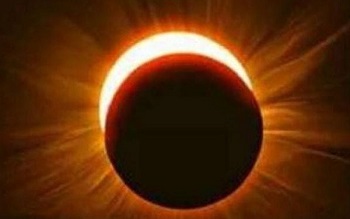KARACHI: Pakistan Stock Exchange above the 98,000 mark on Friday as share prices surged more than 2,000 points in intraday trade
ISLAMABAD: An annular solar eclipse, said to be the last big celestial event of the year as it comes to a close, descended upon parts of Pakistan on Thursday morning.
Starting at 7:30am, it peaked at 8:37am and is to go on till 1:06pm. The eclipse was also viewed in other countries including Myanmar, Indonesia, the United Arab Emirates and parts of India.
Special or 'Kusoof' prayers were offered in various mosques including Faisal Mosque in Islamabad.
The Pakistan Meteorological Department had said the eclipse would be visible all over Pakistan, especially in Karachi and Gwadar. It said the celestial event would be visible in eastern Europe, northern and western Australia, eastern Africa, Pacific Ocean and Indian Ocean, and much of Asia, including Pakistan.
People have been advised not to look at the sun with the naked eye during the eclipse because it may cause permanent eye damage or even blindness.
The Met Department shared the duration of the eclipse in various cities of Pakistan:
The solar eclipse is not a total eclipse but an annular one. This means the sun and the moon will be positioned in a way to form a "ring of fire" as the moon won’t be able to completely cover the sun. Hence its edges will be illuminated.
The rare and historic event is completely different from the total solar eclipse that took place in August 1999 due to the 'albedo effect'. It means that most of the radiation did not reach the ground and got deflected back into space because of cloudy skies previously. But this time there are clear skies. Therefore, there will be a direct impact of the radiation. People have been advised not to look at the sun with the naked eye during the eclipse.
Safety during eclipse
The moon covers the sun during the start of a rare "ring of fire" solar eclipse in Jakarta on December 26. — AFP
There are several superstitions being associated with the celestial event. Some say it may bring about major changes in world politics with shifts in power.
Other beliefs include thoughts of fear. In ancient China, people used to counter the effects of a solar eclipse by getting together and screaming aloud. They believed that there was a big snake eating up the moon which needed to be stopped and scared away with the noise.
Children view an annular solar eclipse in Madinat Zayed in the Al Dhafra region of Abu Dhabi, United Arab Emirates on December 26. — Reuters
Some believe expectant mothers should not go out when there is a solar eclipse and to stay away from sharp objects. Pregnant animals such as livestock are also brought indoors at such times.
There is also a belief that there are stage germs unleashed during a solar eclipse so all eatables are also kept covered or in the fridge.
Some countries announce a public holiday on such occasions.
You May Also Like
TEHRAN: The head of Iran’s Revolutionary Guards described the arrest warrant issued by the International Criminal Court for Israeli Prime
LOWER KURRAM: The death toll in yesterday’s gun attack on passenger vans in Khyber Pakhtunkhwa’s Lower Kurram has risen to 42,






